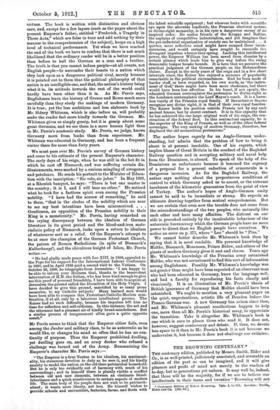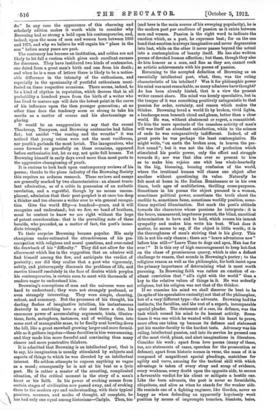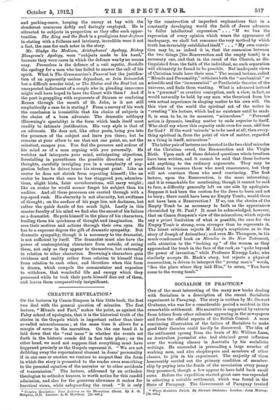THE BROWNING CENTENARY.*
THE centenary edition, published by Messrs. Smith, Elder and Co., is as well-printed, judiciously annotated, and covetable an edition of the poet as can be imagined, and it will give pleasure and profit of mind not merely to the readers of to-day, but to generations yet unborn. It may well be, indeed, that these will be the majority, for if we are to believe our intellectuals in their teens and twenties " Browning will not • Centenary Milian of Bober& Browning. lrols. L to III. London : Smith, Elder and Co. [10a. ed.]
do." In any case the appearance of this charming and scholarly edition makes it worth while to consider why Browning had so strong a hold upon his contemporaries, and, indeed, upon the mass of men and women born between 1850 and 1875, and why we believe he will regain his " place in the sun " before many years are past.
The centenary has become an institution, and critics are not likely to let fall a custom which gives such excellent excuses for discourse. They have instituted two kinds of centenaries, one dated from a great man's birth and one from his death ; and when he is a man of letters there is likely to be a notice- able difference in the intensity of the enthusiasm, and especially in the spontaneity of youthful enthusiasm mani- fested on. these respective occasions. There seems, indeed, to be a kind of rhythm in reputation, which decrees that in all probability a hundred years from the birth of a writer who has lived to mature age will date the lowest point in the curve of his influence upon the then younger generation ; at no other time does the tendency seem so strong to take his merits as a matter of course and his shortcomings as glaring.
It would he an exaggeration to say that the recent Thackeray, Tennyson, and Browning centenaries had fallen flat ; but amidst "the roaring and the wreaths" it was noticed that young voices were not the most vociferous, nor youth's garlands the most lavish. The inaugurators, who came forward so gracefully on these occasions, appeared before enthusiastic but, let us say, not quite full houses. Yet Browning himself in early days owed more than most poets to the aggressive championing of youth.
It is curious to look back upon contemporary reviews of his poems; thanks to the pious industry of the Browning Society this requires no arduous research. These reviews and essays are generally marked by two characteristics : an almost trucu- lent admiration, as of a critic in possession of an aesthetic revelation, and a regretful, though by no means aneom- pla.cent, admission that their poet-prophet is at once too deep a thinker and too obscure a writer ever to win general recogni- tion. Give the world fifty—a hundred—years, and it will recognize and understand; but we few, we band of brothers, must be content to know we are right without the hope of patent corroboration: that is the prevailing note of these heralds, who preceded, as a matter of fact, the poet's imme- diate triumph.
To their surprise Browning became popular. His early champions under-estimated the attractiveness of his pre- occupation with religious and moral questions, and over-rated the drawback of his "difficulty." They did not allow for the allurement which lies in the suggestion that an admirer will find himself among the few, and anticipate the verdict of posterity ; nor did they realize that a poet who vigorously, subtly, and picturesquely discusses the problems of life, and carries himself resolutely in the face of doubts which perplex his contemporaries, is certain soon to meet with thousands of readers eager to understand him.
Browning's conceptions of man and the -universe were not hard to understand ; they were not strangely profound, or even strangely interesting. They were simple, cheering, robust, and summary. But the processes of his thought, his darting flashes of imaginative intuition, his instantaneous dexterity in snatching here a clue and there a clue, his enormous power of accumulating arguments, hints, illustra- tions, facts, metaphors, instances, and of welding them into some sort of manageable mass, to be finally sent bowling down the hill, like a great snowball growing larger and more formid- able as it gathers impetus—these faculties in him were amazing, and they made him more forceful and convincing than many clearer and more penetrative thinkers.
It is admitted that Browning is an intellectual poet, that is to say, his imagination is usually stimulated by subjects and aspects of things to which he was directed by an intellectual interest. He seldom attempts to express anything so vague as a mood ; consequently he is not at his best as a lyric poet. He is rather a master of the arresting, complicated situation, of the critical moment in the story of a man's heart or his faith. In his power of evoking scenes from certain stages of civilization now passed away, and of evoking them to the modern eye and understanding, with their typical passions, manners, and modes of thought, all complete, he has had only one equal among historians—Carlyle. Then, too (and here is the main source of his sweeping popularity), he is the modern poet par excellence of passion as it exists between men and women. Passion is the right word to indicate the emotion which, as a poet, he expresses best; for on the one hand that emotion is always imaginative and never degenerates into lust, while on the other it never passes beyond the actual into a contemplation of beauty itself. He has also written poems of devoted human affection; but these, though they also do him honour as a man, and fine as they are, cannot rank as artistic achievements with his poems of passion.
Returning to the accepted definition of Browning as an essentially intellectual poet, what, then, was the ruling characteristic of his intellect P Was it for philosophic power his mind was most remarkable, as many admirers have thought? As has been already hinted, that is a view the present writer cannot share. His mind was keenly speculative, but in the temper of it was something positively antagonistic to that passion for order, certainty, and reason which makes the thinker. Browning loved a world lit by broken, vivid lights, a landscape seen beneath cloud and gleam, better than a clear world. He was, without abatement or regret, a romanticist. To him the mere spectacle of the ceaseless activity of man's will was itself an abundant satisfaction, while to the science of ends he was comparatively indifferent. Indeed, of all great poets he was perhaps the least contemplative. He might write, "on earth the broken arcs, in heaven the per- fect round"; but it was not the idea of perfection which stimulated his poetic power, only the effort and struggle towards it ; nor was that idea ever so present to him as to make him rejoice one whit less whole-heartedly in the big, blooming, buzzing confusion of the world, where the irrational human will chases one object after another without questioning its value. Naturally he felt most at home in the Italian Renaissance or in his own times, both ages of multifarious, thrilling cross-purposes. Sometimes in his poems the object pursued is a woman, sometimes political power, sometimes the truth about the enclitic SE, sometimes fame, sometimes worldly position, some- times mystical illumination. But mark the poet's attitude towards the characters whose passions he interprets : it is the brave, unmeasured, impetuous pursuit, the blind, uncritical determination to have and to hold, which rouses his inmost sympathy and makes him write his best. What does it matter, he seems to say, if the object is little worth; it is the thoroughness of man's striving that is his glory. This life is not his only chance ; there are " brave adventures new " before him still—" Leave Time to dogs and apes, Man has for ever !" It is this cry of high encouragement to keep hot-foot on the chase of promiscuous quarry, which is also a defiant challenge to reason, that sounds in Browning's poetry ; to the religious reason as well as the philosophic, for both insist upon the primary importance of determining what is most worth pursuing. In Browning faith was rather an emotion of ex- ultant conviction that " all's right with the world " than a key to the relative values of things in it. He was ardently religious, but his religion was not that of the thinker.
If we examine his mind we shall discover its bent to be (in spite of his speculative curiosity) not that of the philosopher, but of a very:different type—the advocate. Browning had the instincts, the faculties, and the zest of a superb, incomparable special pleader. The statement of a case, its defence, was the task which roused his mind to its keenest activity. Some- times it was one which he wanted with all his heart to prove, more often one taken up because its defence and statement put his master-faculty to the hardest tests. Advocacy was his ruling, intellectual passion, and into its service he pressed one of the most vivid, pliant, and alert imaginations in literature. Consider his work ; apart from love poems (many of these, too, are statements of cases, speeches for the prosecution or defence), apart from historic scenes in verse, the mass of it is composed of magnificent special pleadings, matchless for agility and verve, amazing for the tactical skill with which advantage is taken of every stray and scrap of evidence, every weakness, every doubt upon the opposite side, to secure a favourable verdict for his client or mitigate a hostile one. Like the born advocate, the poet is never so formidable, ubiquitous, and alive as when he stands for the weaker side. He reminds one of a fighting engineer, like Gordon, never so happy as when defending an apparently hopelessly weak position by means of impromptu trenches, blankets, bales,
and packing-cases, keeping the enemy at bay with the slenderest resources deftly and daringly employed. He is attracted to subjects in proportion as they offer such oppor- tunities. The Ring and the Book is a prodigious tour-de-force in stating with a fullness and intricacy, incredible were it not a fact, the case for each actor in the story.
Mr. Sludge the Medium, Aristophanes' Apology, Bishop Blougram's Apology, were "subjects made to his hand," because they were cases in which the defence was by no means easy. .Paracelsus is the defence of a rats mystic, Bordello the apology for a man who has failed to answer the call of his spirit. What is The Grammarian's Funeral but the justifica- tion of an apparently useless dryasdust, or Ivcin Irocinovitch but a difficult murder trial, or The Statue and the Bust but an unexpected indictment of a couple who in pleading innocence might well have hoped to have the Court with them P And if the poet is grappling with arguments of Strauss or confuting Renan through the month of St. John, is it not still emphatically a case he is stating P From a survey of his work the conclusion is irresistible that his choice of subjects is the choice of a born advocate. The dramatic soliloquy (Browning's speciality) is the form which lends itself most readily to intimate justification. His very style is that of an advocate. He does not, like other poets, bring you into the presence of the subject and leave you there; but he remains at your elbow to see that not one point, no, not the minutest, escapes you. You feel the pressure and ardour of his mind as of a man arguing with you personally. He watches and interprets your mind, anticipating objections, forestalling in parentheses the possible direction of your thoughts, carefully inveigling you in a complexity of sug- gestion before he drives home his strongest point. Like an orator he does not shrink from repeating himself; like an orator he knows that once he has staggered you, adumbra- tions, slight hints, faint corroborations, will carry weight ; like an orator he would sooner forget his subject than his auditor. And all these processes are carried through with a top-speed rush. His obscurity is not obscurity, but swiftness of thought ; on the surface of his page lies, not darkness, but rather the quick dazzle of too much light. Lastly in this master-faculty of his mind we find also the secret of his failure as a dramatist. He puts himself in the place of his characters, lending them his quickness of thought and imagination. He sees their motives and actions through their own eyes. He has to a supreme degree the gift of dramatic sympathy. But dramatic sympathy, though it is necessary to the dramatist, is not sufficient by itself. The dramatist must also have the power of contemplating characters from outside, of seeing them, not only as they appear to themselves, but externally in relation to other characters. Browning's characters gain vividness and reality rather from relation to himself than from relation to each other, and therefore when this form is drama, which compels the commentator and expositor to withdraw, that wonderful life and energy which they possessed while he took their parts himself dies out of them, and leaves them comparatively insignificant.




































































 Previous page
Previous page